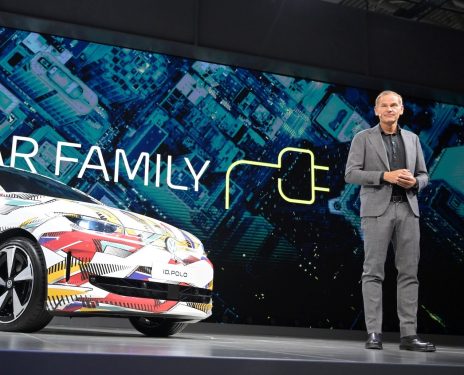Welcome back. There is a lot of future of transportation news to keep track of, so let’s jump in. This is comeback week, not just because of my return but due to the biennial IAA Mobility conference in Munich. The event showcased a purposeful effort among German automakers to show the world they can still offer compelling, technologically advanced, and affordable vehicles. The subtext of the splashy event was a clear message to China: they are not out of the race.
Volkswagen Group, Mercedes, and BMW all showcased numerous new vehicles, including electric models. Executives made their battle cries; VW Group’s Oliver Blume struck a bullish tone in interviews and laid out the company’s plan to be competitive in China, particularly with EVs, a category where VW has lagged.
But the challenge exists on the home front as well. Chinese automakers have been pushing into Europe, and consumers have responded. German automakers are hoping their latest products—including a new all-electric Mercedes GLC, the BMW iX3 with its four “superbrain” computers, and the Volkswagen ID Polo and ID Cross concepts—will preserve and even grow market share. They have work to do, however. According to a July report from JATO Dynamics, Chinese companies like BYD almost doubled their market share in Europe over the past year.
Another notable item from IAA involves Rimac Technology, the tech and parts unit of Rimac Group, which has developed solid-state battery packs it says will be available by late 2027. These batteries apparently pack in more energy and can be charged from 10% to 80% in under 10 minutes.
Hyundai appears to still be committed to Motional, according to sources who shared new investment information. Hyundai and Aptiv had created the joint venture Motional with an agreement to invest $4 billion. After Aptiv backed out in early 2024, Hyundai opted to invest $1 billion, which included $475 million directly into Motional and another $448 million to buy out part of Aptiv’s stake.
Now it appears Hyundai is investing more into Motional in two tranches. The first, being dispersed this year, is about $452 million. A second tranche is expected next year. Hyundai declined to respond to questions about the funding. This silence is typical for large corporations, though it might also be because Hyundai is working with Waymo.
In other hiring news, there are two new hires at General Motors. Sony Mohapatra, the former senior manager of AI compute platforms at Cruise, is now director of AI and machine learning engineering at GM. Paul Menson, formerly senior staff account manager of Megapack at Tesla, is now director of energy storage systems business development at GM.
Via, the transit software startup known for its consumer-facing on-demand shuttle service and Citymapper app, has made its IPO debut. The company sold 10.7 million shares for $46 per share, raising $492.9 million at a $3.7 billion valuation. This is slightly above its $3.5 billion valuation from its last venture raise in 2023.
Other deals that got attention include Arc Boats, which signed a $160 million contract with Curtin Maritime for new hybrid-electric tugs expected to hit the waters around the Los Angeles port in 2027. LeydenJar, a Netherlands-based battery materials startup, raised €13 million. Standard Fleet, a fleet management software company, raised $13 million in a Series A round.
The Federal Aviation Administration announced a new pilot program that will let electric vertical takeoff and landing startups test some operations before they receive full regulatory certification.
Hyundai’s electric air taxi startup Supernal has paused work on its aircraft program after a rocky few months that saw staff cuts and the departure of its CEO and CTO.
InDrive, the Mountain View-based startup known for its bidding-based ride-hailing model, has big plans to become a global super app.
Jaguar Land Rover said a cyberattack brought vehicle assembly lines to a standstill.
Lyft and May Mobility have launched a robotaxi service in Atlanta, the first commercial deployment in their partnership.
Nevada’s Occupational Safety and Health Administration opened an investigation after a Boring Company employee sustained a crushing injury working on a tunnel in Las Vegas, halting work at the site.
Tesla has secured a permit to begin testing autonomous vehicle technology on public roads in Nevada. The company will still need to complete a self-certification process and gain separate approval to operate a commercial ride-hailing service.
Uber and Chinese autonomous vehicle startup Momenta plan to start testing robotaxis in Munich starting in 2026.
The U.S. Justice Department filed a lawsuit against Uber, accusing the ride-hailing company of violating federal law by discriminating against people with physical disabilities.
TechCrunch Disrupt 2025 is happening in San Francisco from October 27 to 29. The event will include speakers from the transportation world such as Wayve co-founder and CEO Alex Kendall, Waymo co-CEO Tekedra Mawakana, and Flexport founder and CEO Ryan Petersen.

